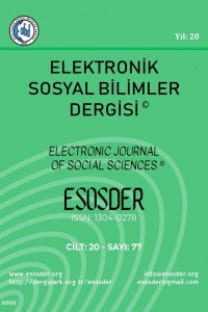FARKLI PROGRAMLARDA OKUYAN ÖĞRETMEN ADAYLARININ "BİYOLOJİK ÇEŞİTLİLİK" KAVRAMINA YÖNELİK ALTERNATİF ANLAYIŞLARI VE OLASI NEDENLERİ
Bu araştırmanın amacı Eğitim Fakültesinde öğrenim görmekte olan farklı programlardaki öğretmen adaylarının "biyolojik çeşitlilik" kavramı ile ilgili alternatif anlayışlarını çeşitli değişkenler bakımından ortaya koymaktır. Araştırmada durum tespitine yönelik, nicel araştırma paradigmasına dayanan betimsel (tarama) yöntem kullanılmıştır. Öğretmen adaylarının biyolojik çeşitlilik kavramı hakkındaki bilişsel anlayışlarının belirlenmesi amacı ile Selvi (2007) tarafından geliştirilen ölçme aracı uyarlanmıştır. Ölçme aracı, Recep Tayyip Erdoğan Üniversitesi Eğitim Fakültesi'nin Sınıf Öğretmenliği, Matematik Öğretmenliği, Sosyal Bilgiler Öğretmenliği ve Fen Bilgisi Öğretmenliği programlarına devam eden toplam 585 öğretmen adayına uygulanmıştır. Verilerin analizi için t-testi, tek yönlü varyans analizi ve varyans analizinde farkın yönünü belirlemek için ise, post-hoc testlerinden Sheffe testi kullanılmıştır. Analizler sonucunda öğretmen adaylarının bu çalışmada ele alınan biyolojik çeşitlilik kavramı ile ilgili bazı yanlış öğrenmelerinin olduğu tespit edilmiştir. Elde edilen verilere göre aile ve sosyal çevre biyoçeşitlilik konusunda bilişsel puanların en düşük olduğu bilgi kaynaklarıdır. Sonuç olarak bu araştırma, farklı programlardaki geleceğin öğretmenleri olarak düşünülen öğretmen adaylarının biyolojik çeşitlilik kavramı üzerinde yeterli düzeyde bilişsel anlayışlara sahip olmadığını ortaya koymuştur.
Anahtar Kelimeler:
Öğretmen adayları, biyolojik çeşitlilik, bilişsel anlayış
THE POSSIBLE REASONS AND ALTERNATIVE UNDERSTANDINGS OF UNIVERSITY STUDENT TEACHERS IN DIFFERENT PROGRAMMES ABOUT "BIODIVERSITY" CONCEPT
Abstract The aim of this research brought to light alternative understanding regarding "biodiversity concept" of pre-service teacher enrolled in different departments at education faculty in terms of variant variables. The descriptive methods based on quantitative research paradigms were used in this research. With aim of determining the cognitive levels of university students related to "biodiversity concept" the measuring instruments developed by Selvi (2007) utilizing from literature were applied to pre-service students. The measurement instruments were applied to a total of 585 pre-service teachers in the departments of Science Education, Social Science Education, Mathematics Education and Primary Education of Education Faculty, Recep Tayyip Erdogan University. T-test and one-way variance were used in data analyses. In addition to these to determine the direction of the difference were also used the Scheffe test from post-hoc tests. In a result of analysis, it was seen that the pre-service teacher had some cognitive misconceptions regarding biodiversity concept. According to the data being obtained this study, family and social environmental are knowledge resources in which cognitive scores are the lowest. As a result, this research brought to light that pre-service teacher thought as future's teachers in different branches had not cognitive understanding on biodiversity concept on enough level. Key Words: Prospective teachers, biodiversity, cognitive understandings
Keywords:
Prospective teachers, biodiversity, cognitive understandings,
- ISSN: 1304-0278
- Yayın Aralığı: Yılda 4 Sayı
- Başlangıç: 2002
- Yayıncı: Cahit AYDEMİR
Sayıdaki Diğer Makaleler
EĞİTİM DENETMENLERİNİN MESLEKİ GELİŞİM, TÜKENMİŞLİK ve İŞ DOYUMUNA İLİŞKİN BİR META-SENTEZ ÇALIŞMASI
TÜRK KAMU KURUMLARINDA PERFORMANS DEĞERLENDİRMENİN ETKİN HALE GETİRİLMESİ: EMNİYET TEŞKİLATI ÖRNEĞİ
NON-LINEAR MARKET BEHAVIOR AT THE ISTANBUL STOCK EXCHANGE
ÖĞRETMEN KARİYER BASAMAKLARINDAN UZMAN ÖĞRETMENLİK UYGULAMASININ DEĞERLENDİRİLMESİ
Süleyman GÖKSOY, Mahmut SAĞIR, Şenyurt YENİPINAR
ŞEHRISTANI'YE GÖRE KELAMI PROBLEMLERIN MENŞEI
MERKEZ VE TAŞRADA YERLEŞİK YENİÇERİ-HALK ÇEKİŞMESİ
EVALUATION OF INTERDISCIPLINARY TEACHING APPROACH IN GEOGRAPHY EDUCATION
Mustafa SAĞDIÇ, Hilmi DEMİRKAYA
FLÖRTTE ŞİDDETE YÖNELİK TUTUM ÖLÇEKLERİNİN GÜVENİRLİK VE GEÇERLİK ÇALIŞMASI
